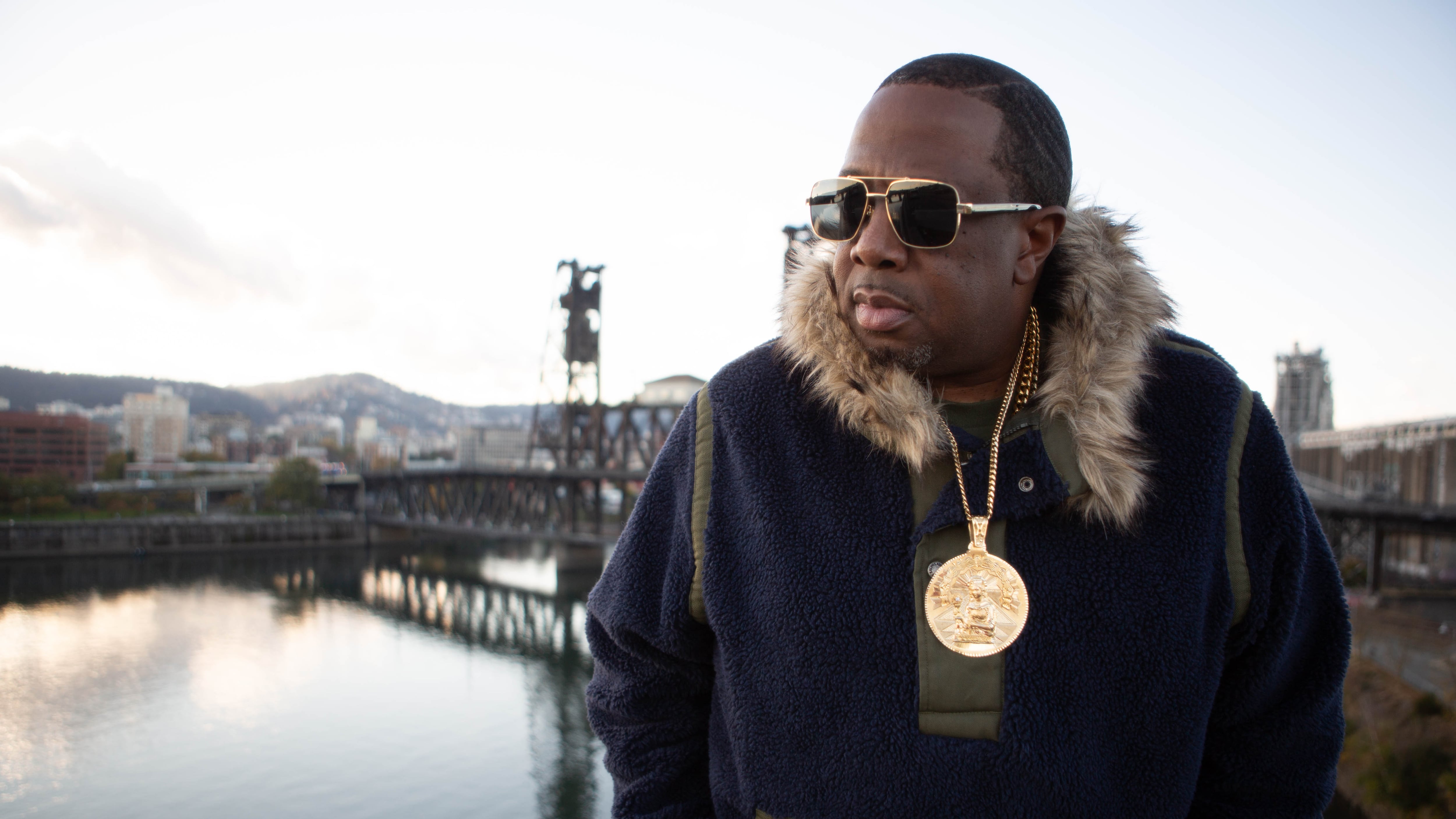No one else looked like Vursatyl in high school. Growing up in Northeast Portland as the son of a local pastor and musician, the rapper born Marlon Irving fell in love with hip-hop early, and he went to great pains to adopt the fashions of his favorite rappers.
“You couldn’t get the stuff that I was wearing in Portland,” he says. “Because I had parents who traveled, I was able to go to different states and pick up things that resembled hip-hop culture. This was before rap videos were really popular.”
Nearly 40 years later, the 54-year-old still lives and breathes hip-hop. He came to fame in the 2000s with his group Lifesavas, which put out two albums on legendary Bay Area indie label Quannum Projects, and though that band hasn’t put anything out since 2007’s acclaimed concept album Gutterfly, Vursatyl has kept plenty busy in the time since; he’s released a killer run of solo singles in the past few years, often in collaboration with his protégé Lunden Benard.
He’ll perform Sunday, Dec. 29, at McMenamins White Eagle Saloon with Los Angeles turntable legend J Rocc, Seattle vinyl vet Vitamin D, and his Lifesavas partner, Rev. Slides.
As a historian of hip-hop, Vursatyl understands that the DJ has played at least as important a role in the music as the MC. By shining a spotlight on these three DJs, he hopes to help set the record straight.
“Now we see the rapper being the big star,” Vursatyl says. “It’s just important to keep the balance of information that the DJ was always the foundation of the culture and really was sort of the center.”
This kind of humility shouldn’t be surprising from a rapper whose best-known song with Lifesavas, “HelloHiHey,” takes the form of a literal battle between an artist and his ego. But according to critic Robert Christgau’s review of Lifesavas’ 2003 debut, Spirit in Stone: “Without his secret belief that he’s the greatest rapper in the universe, [Vursatyl] couldn’t be a good one.”
Vursatyl was born and raised in Northeast Portland, the son of the late Bishop Marcus Irving of Albina Christian Life Center. He first honed his chops in singing groups, performing to his father’s congregation.
“My parents were always very supportive,” Vursatyl says. “When I started rapping, my first audience was the church.”
Vursatyl attended Jefferson High School, where mutual friends took notice of his fashion sense and introduced him to another local hip-hop head, Grant High School student Solomon David. The two began playing basketball at Alberta Park and spitting freestyle raps together, and David soon took on the rap name Jumbo the Garbageman.
“He kind of dressed like how I dress,” Vursatyl says. “So when I met him at Alberta Park, we both had the same experience—like, ‘Man, people have been telling me I need to meet you,’ and vice versa.”
At the time, gang activity was a growing problem in Vursatyl’s area of Northeast Portland. “In ’83 or ’84, some members of the Crips gang had come to Portland and moved to a block called Kerby,” he says. “My high school, Jefferson, was in between Commercial and Kerby.”
Vursatyl lost several close friends to gang violence during this time, including his best friend, Gilbert Myles, killed by a Crip allegedly over the color of his hat, and another aspiring rapper named David Kalamafoni, who was shot dead not long after he and Vursatyl had written an anti-violence song called “Stop the Madness.” Both were only 17 when they died.
“We wanted to be a group, David and I,” Vursatyl says. “So when David got killed, that became a conversation for me and Jumbo to work together.”
Lifesavas officially formed in 1990 and went through various lineup changes before becoming the trio of Vursatyl, Jumbo and Rev. Slides and releasing their first cassette single, “Grand Larceny”/“Cream Team 2000,” in 1998 on their own Misfit Records.
Xcel of Bay Area hip-hop duo Blackalicious happened to hear it while shopping at Jump Jump Music in Northeast, and he took the group on tour, introducing them to underground hip-hop legends like Latyrx and DJ Shadow.
To Vursatyl, one of the most exciting things about indie-rap stardom was the A&R resources to which he suddenly had access. In 2003, the same year Spirit in Stone came out, Vursatyl began teaching Hip-Hop 101, as an after-school program at Portland high schools.
“I had these resources at the time that I wanted to share because Lifesavas was taking off,” he says. “We brought Charlie Ahearn, the director and producer of the first hip-hop movie that was ever made, called Wild Style. DJ Grand Wizard Theodore, the DJ who invented the scratch, came to our workshop.”
Though Vursatyl stopped teaching the class in 2008, his efforts to pass down the history of hip-hop to a new generation have never faltered, and he sees his forthcoming show at the White Eagle as the next step in his mission.
“All of this is really to maintain a voice in Portland,” he says. “This is all about sharing my platform, my legacy, my music, my interest, my wisdom, just in order to provide something for the next generation.”
SEE IT: Vursatyl at McMenamins White Eagle Saloon, 836 N Russell St., 503-282-6810, mcmenamins.com/white-eagle-saloon-hotel. 8 pm Sunday, Dec. 29. $20. 21+.

